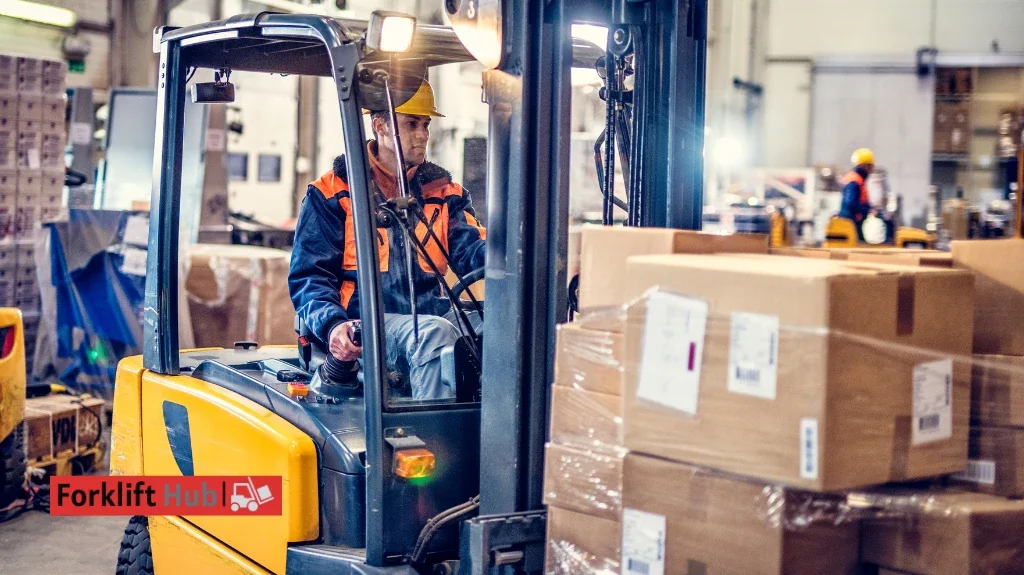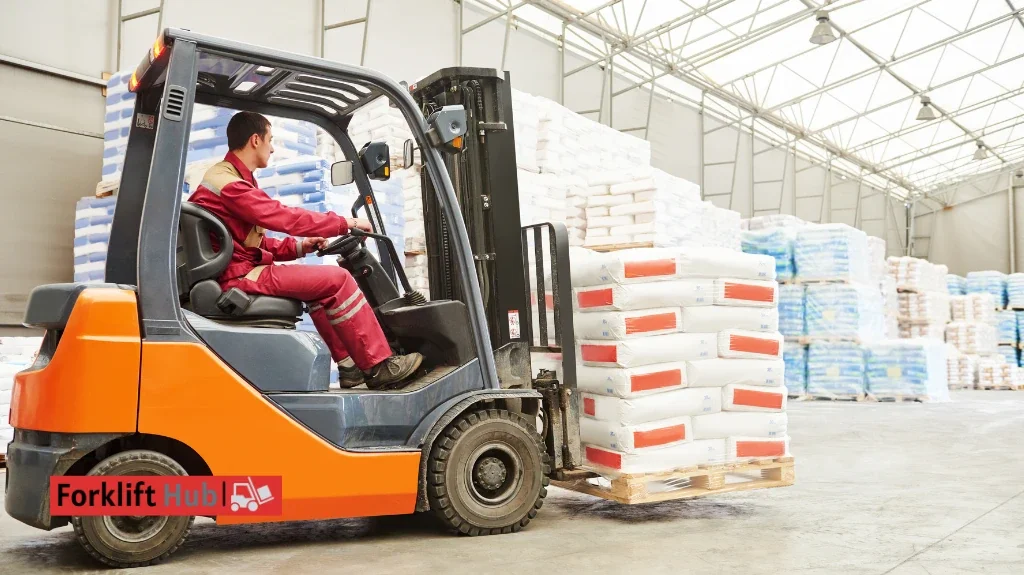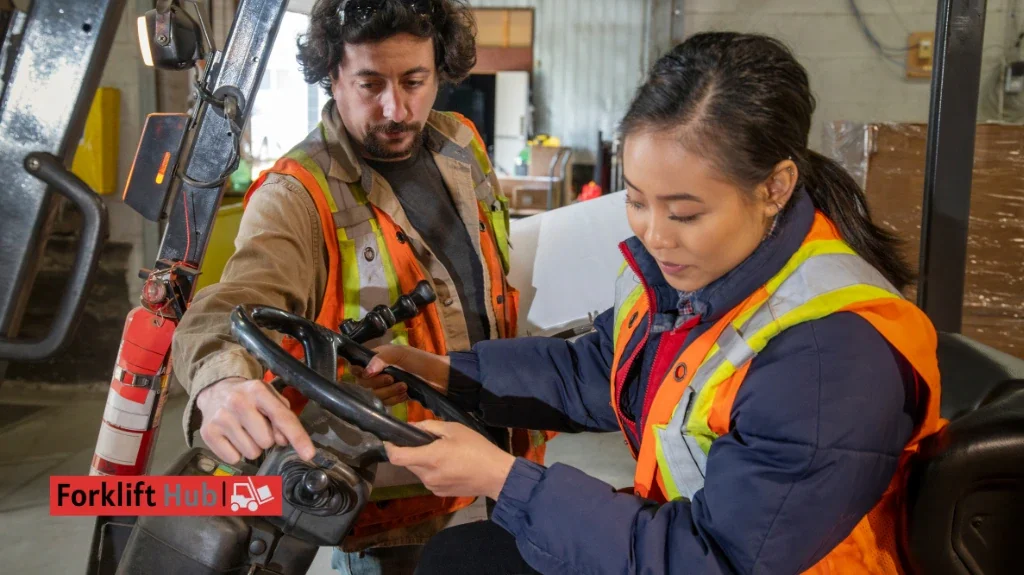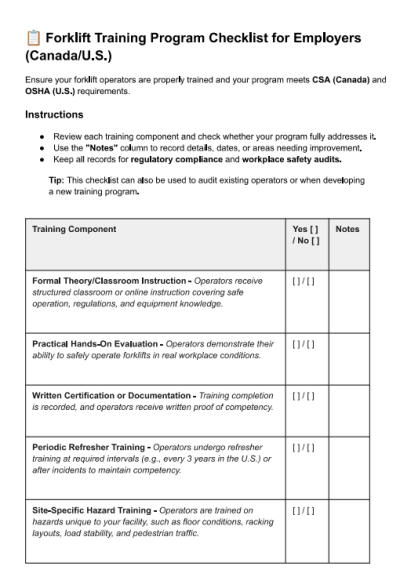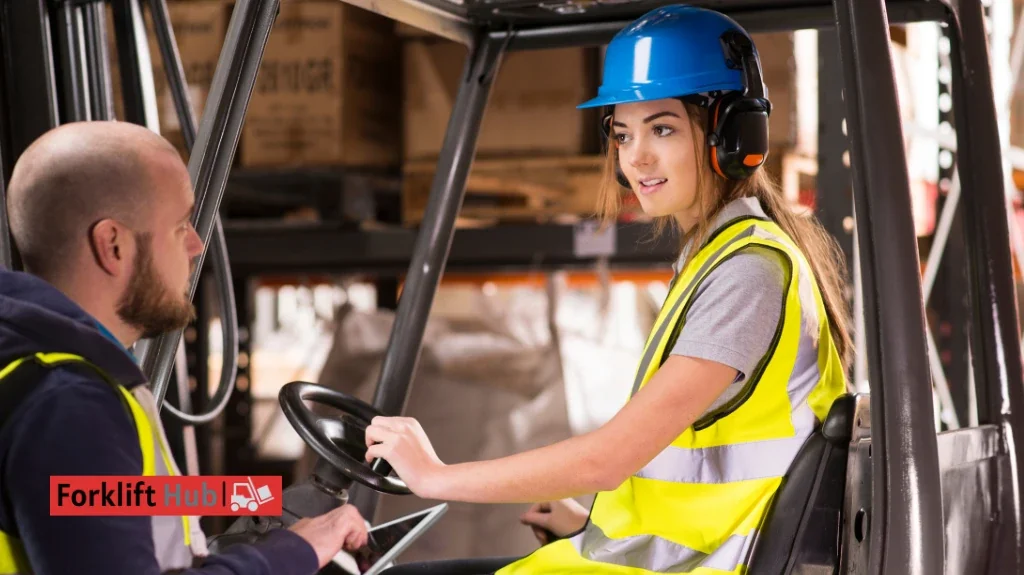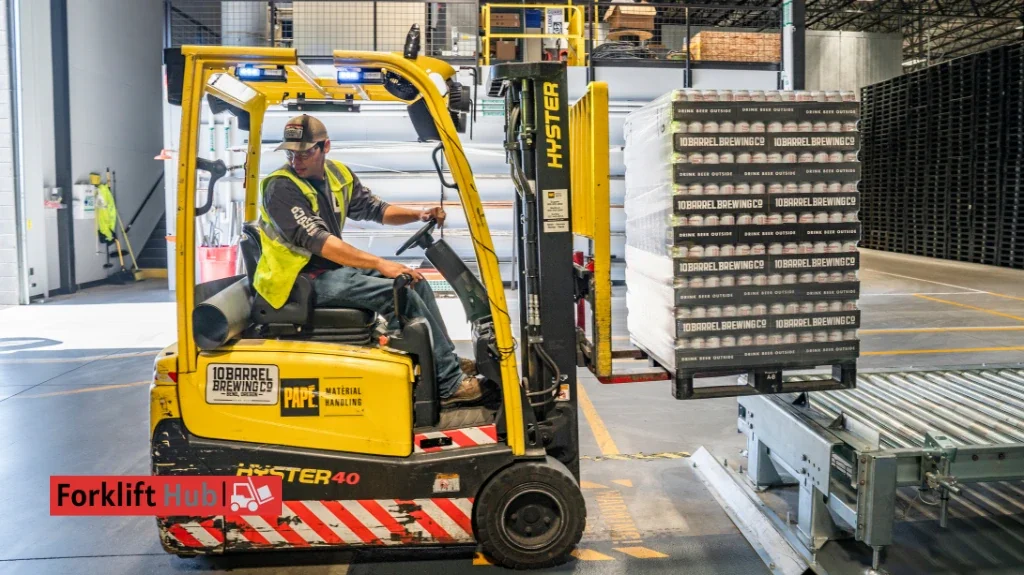What Forklift Training Is Required by Law: Listed by Province and State
In this guide, we’ve summarized forklift training requirements across Canada and the United States, grouping provinces and states with similar rules. You’ll find official government links for each jurisdiction, so you can easily review the complete regulations and confirm your program meets the law.
Operating a forklift is a serious responsibility, and every jurisdiction has laws to ensure operators are trained and competent. Whether you manage a warehouse, construction site, or retail facility, understanding these legal requirements helps you stay compliant and keep your team safe.
1. How We Grouped the Rules (Methodology)
2. Quick Summary Chart
3. Grouped Jurisdiction Sections
Group A — Canada: Provinces & Territories (Grouped by Regulatory Approach)
Group B — Federal/U.S. OSHA Standard (applies to most U.S. employers)
Group C — State-Plan States or States with Supplemental Rules
4. Forklift Training Requirements in the U.S. and Canada
5. Appendix: Full Province & State Table (Alphabetical)
6. Sample Jurisdiction Entries (examples to copy across the list)
Ontario
British Columbia (WorkSafeBC)
Alberta
Other Provinces
Quebec (CNESST)
California (Cal/OSHA)
7. Downloadable Checklist
8. FAQ Section
Stay compliant and keep your team safe with ForkliftHub’s OSHA- and CSA-approved training programs. Book your training today.
Key Takeaways
Forklift training is legally required in all Canadian provinces and U.S. states, with specific rules varying by jurisdiction.
Most jurisdictions require formal classroom instruction, practical hands-on evaluation, and periodic refresher training.
Employers can provide training internally as long as it meets regulatory standards and proper documentation is maintained.
Operators trained in one province or state may need additional evaluation or training to work in another jurisdiction.
Maintaining records of training, evaluations, and certifications is essential for compliance and workplace safety.
Following proper forklift training regulations helps prevent accidents, protect equipment, and improve operational efficiency.
Official government resources, such as CCOHS (Canada) and OSHA (U.S.), provide authoritative guidance for each jurisdiction.
Certified training programs, like those offered by ForkliftHub, ensure that operators meet both legal requirements and industry best practices.
What Forklift Training Is Required by Law — Listed by Province and State
1. How We Grouped the Rules (Methodology)
To make it easier to understand forklift training requirements across Canada and the United States, we organized provinces and states based on similarities in their regulations. The following points explain our approach.
We reviewed official government sources for each province and state. This ensured the information reflects the most current legal requirements.
We grouped jurisdictions with similar training requirements together. This helps you quickly identify which rules apply without reading each regulation individually.
We summarized the key components of training. These include mandatory classroom instruction, practical evaluation, refresher courses, and documentation or certification requirements.
We provided direct links to official sources. You can verify the regulations and access full details straight from government websites.
We noted special considerations where applicable. Some jurisdictions have additional rules for certain industries or types of equipment.
By following this methodology, we aimed to provide a clear and organized reference for forklift operators, managers, and safety officers.
Our grouping makes it easier to compare jurisdictions. You can quickly see which provinces and states share similar training standards.
It simplifies compliance planning. Businesses can align their training programs with legal requirements without reviewing dozens of separate regulations.
It highlights resources for further information. Direct links to government sites ensure you have access to the full legal details if needed.
This approach ensures that our guide is both accurate and easy to use, giving you a practical resource for understanding and meeting forklift training requirements.
2. Quick Summary Chart
To help you quickly understand forklift training requirements, we’ve created a summary chart that groups provinces and states with similar rules. The chart highlights key training elements, making it easy to see the main legal obligations at a glance.
The chart shows which jurisdictions require formal classroom instruction. This ensures operators learn essential safety and operational knowledge before using a forklift.
It indicates whether practical evaluation is mandatory. Hands-on assessment confirms that operators can safely handle equipment in real-world conditions.
It notes if refresher training is required. Some provinces and states mandate periodic retraining to maintain certification and compliance.
It includes links to official government resources. You can click these links to access the full legal requirements and guidance for each jurisdiction.
| Jurisdiction | Classroom Instruction Required | Practical Evaluation Required | Refresher Training Required | Official Government Link |
|---|---|---|---|---|
| AB, BC, MB, NB, NL, NS, ON, PE, QC, SK | Yes, formal classroom instruction is required under CSA B335 standards. | Yes, practical hands-on evaluation is required. | Yes, refresher training is required periodically or when incidents occur. | CCOHS: Forklift Safety |
| All U.S. States | Yes, formal classroom or online instruction is required under OSHA 29 CFR 1910.178. | Yes, practical hands-on evaluation is required. | Yes, refresher training is required every 3 years or after an incident. | OSHA: Powered Industrial Trucks |
| California | Yes, classroom instruction is required following OSHA standards plus Cal/OSHA guidance. | Yes, practical evaluation is required, including on-site facility checks. | Yes, refresher training every 3 years or after a safety incident. | Cal/OSHA Forklift Safety |
Using this summary chart allows you to quickly compare training requirements across Canada and the United States without reviewing each regulation individually.
The chart simplifies compliance planning for businesses. Employers can easily determine which training components are needed for their operators.
It helps operators understand their obligations. Employees can see at a glance what steps they need to take to stay legally certified.
It serves as a practical reference tool. The combination of grouped jurisdictions and official links ensures users have both an overview and access to detailed information.
By providing a clear, organized summary, this chart makes it easier to plan, implement, and verify forklift training programs in compliance with the law.
3. Grouped Jurisdiction Sections
To make it easier to understand forklift training requirements, we’ve grouped provinces and states based on similarities in their regulations. This approach helps you quickly see which jurisdictions share the same rules and what key training elements are required.
Group A - Canadian Provinces Following CSA Standards:
Alberta, British Columbia, Manitoba, New Brunswick, Newfoundland and Labrador, Nova Scotia, Ontario, Prince Edward Island, Quebec, Saskatchewan.
All these provinces require formal classroom instruction for forklift operators.
Practical hands-on evaluation is mandatory to confirm operator competency.
Refresher training is required periodically or after an incident to maintain certification.
Employers must maintain records of training and certification for each operator.
This grouping shows that most Canadian provinces follow similar training standards, making compliance easier for businesses that operate across multiple provinces.
Group B — Federal/U.S. OSHA Standard (applies to most U.S. employers)
Applies in all states
Classroom or online instruction is required for all forklift operators.
Practical evaluation must be conducted to confirm that operators can safely operate the equipment.
Refresher training is required every three years or sooner after accidents or unsafe operation.
Employers are required to keep documentation of training and evaluations for each operator.
Grouping U.S. states under the OSHA federal standard simplifies compliance, as the core training requirements are consistent nationwide.
Group C — State-Plan States or States with Supplemental Rules
California, New York, Michigan, Texas (examples).
In these states, OSHA standards are supplemented by state-specific regulations or guidance.
Additional on-site evaluations or industry-specific requirements may apply.
Employers should consult official state resources to ensure full compliance.
Highlighting states with unique rules helps operators and employers understand where extra attention is needed to meet local regulations.
By organizing jurisdictions into these groups, you can quickly identify shared requirements and understand where additional rules may apply, making it easier to plan forklift training programs that comply with the law.
4. Forklift Training Requirements in the U.S. and Canada
Across both the United States and Canada, employers are legally required to ensure forklift operators are properly trained, evaluated, and certified before operating powered industrial trucks or lift trucks. While the specific laws and standards differ between jurisdictions, the core goal is consistent: to prevent workplace injuries and maintain safe, efficient operations.
In the United States, forklift training requirements are set by the Occupational Safety and Health Administration (OSHA) under 29 CFR 1910.178(l). Employers must provide both classroom (theory) and hands-on (practical) training, followed by an evaluation of each operator’s performance.
Refresher training is required when an operator is involved in an accident or near miss, observes operating unsafely, or when new equipment or conditions are introduced.
Some states, such as California, Michigan, and Washington, run their own OSHA-approved State Plans and may include additional or more detailed requirements.
In Canada, forklift operator training is regulated provincially but guided by national standards, especially CSA B335: Safety Standard for Lift Trucks. Most provinces reference or adopt this CSA standard directly.
Employers must ensure that operators receive formal instruction, complete a practical evaluation, and are retrained periodically or after workplace changes. Recordkeeping of training and evaluation is also mandatory across all provinces and territories.
The table in the following section summarizes the legal requirements for each jurisdiction across the U.S. and Canada. Each entry includes a short overview of the requirements, the legal basis or key standard that applies, and a direct link to the official government or regulator page for the most accurate and up-to-date information.
How to Use This Table
Jurisdiction: Lists each U.S. state, territory, and Canadian province or territory. Each name links to the appropriate government or regulator site.
Short summary of legal requirement: Provides a concise overview of the main forklift training and certification requirements.
Legal basis / key items: Identifies the regulation, law, or standard (e.g., OSHA 29 CFR 1910.178 or CSA B335) that sets out the requirements.
Official link: Directs you to the regulator’s official website for detailed and current information.
Link to the official government page
5. Full Province & State Table (Alphabetical)
Forklift Training Requirements by Jurisdiction
Here’s a province-by-province and state-by-state breakdown of what forklift training is required by law across Canada and the United States:
| Jurisdiction | Short summary of legal requirement | Legal basis / key items | Official link |
|---|---|---|---|
| United States (Federal OSHA) | All private-sector employers must ensure powered industrial truck (forklift) operators are trained, evaluated and certified. Refresher training required when deficiencies, incidents, or workplace changes occur. | OSHA 29 CFR 1910.178 — employer training, practical evaluation, written records/certification; refresher training as needed. |
OSHA 29 CFR 1910.178 OSHA State Plans (map & links) |
| Alabama | Covered by federal OSHA 1910.178 (employer must train and certify). | OSHA 29 CFR 1910.178 (employer training & certification) | OSHA 1910.178 |
| Alaska (State Plan) | State-plan jurisdiction — follows federal baseline and may have state-specific guidance; employers must train and certify operators. | State Plan (Alaska) — standards at least as effective as federal OSHA; employer training & records required. | OSHA State Plans (select Alaska) |
| Arizona (State Plan) | State-plan jurisdiction — employer training & certification required (see state plan guidance). | Employer must ensure training, practical evaluation and recordkeeping (state plan guidance). | OSHA State Plans (select Arizona) |
| Arkansas | Covered by federal OSHA 1910.178 — employer training, evaluation and certification required. | OSHA 1910.178 baseline requirements. | OSHA 1910.178 |
| California (State Plan) | Cal/OSHA enforces state rules; baseline = OSHA 1910.178 but California publishes guidance and enforces locally. | State Plan (Cal/OSHA) — employer training & practical evaluation; consult Cal/OSHA guidance. | Cal/OSHA via OSHA State Plans |
| Colorado | Federal OSHA 1910.178 applies; employer must train & certify operators. | OSHA 1910.178 | OSHA 1910.178 |
| Connecticut (State Plan — public-sector only) | Connecticut’s plan covers state & local government workers (private employers generally follow federal OSHA); training & certification required where applicable. | State Plan (public-sector); federal OSHA baseline for private sector. | OSHA State Plans (Connecticut) |
| Delaware | Federal OSHA 1910.178 applies; employers must train and certify forklift operators. | OSHA 1910.178 (employer training, practical evaluation, records) | OSHA 1910.178 |
| Florida | Federal OSHA baseline applies; employers must document training & certification. | OSHA 1910.178 | OSHA 1910.178 |
| Georgia | Federal OSHA applies; employers required to train, evaluate and certify operators. | OSHA 1910.178 | OSHA 1910.178 |
| Hawaii (State Plan) | State-plan jurisdiction — consult the Hawaii State Plan for local guidance; employers must ensure training & certification. | State Plan (Hawaii) — local guidance + federal baseline. | OSHA State Plans (Hawaii) |
| Idaho | Federal OSHA 1910.178 applies; employer responsibility to train & certify. | OSHA 1910.178 | OSHA 1910.178 |
| Illinois (State Plan — public-sector only) | State plan covers state & local government; private employers follow federal OSHA (1910.178). | State plan (public) + federal OSHA baseline for private sector. | OSHA State Plans (Illinois) |
| Indiana (State Plan) | State-plan jurisdiction; employer training and evaluation required. | State Plan (Indiana) — employer training & records. | OSHA State Plans (Indiana) |
| Iowa (State Plan) | State-plan jurisdiction; consult Iowa’s standards (at least as effective as federal OSHA). | Employer training & certification, per state plan guidance. | OSHA State Plans (Iowa) |
| Kansas | Federal OSHA 1910.178 applies — employer must train & evaluate operators. | OSHA 1910.178 baseline. | OSHA 1910.178 |
| Kentucky (State Plan) | State plan jurisdiction; employer training & certification required (state plan guidance). | State Plan (Kentucky) — employer training & records obligations. | OSHA State Plans (Kentucky) |
| Louisiana | Federal OSHA applies; employers must ensure training, evaluation and recordkeeping. | OSHA 1910.178 | OSHA 1910.178 |
| Maine (State Plan — public-sector only) | State plan covers government workers; private sector follows federal OSHA; training & certification required where applicable. | State plan (public) + federal OSHA for private employers. | OSHA State Plans (Maine) |
| Maryland (State Plan) | State-plan jurisdiction; employer training & certification required. | State Plan (Maryland) — employer duties mirror federal standard. | OSHA State Plans (Maryland) |
| Massachusetts (State Plan — public-sector only) | State plan covers state & local government workers only; private sector follows federal OSHA. | State plan (public) + OSHA baseline for private sector. | OSHA State Plans (Massachusetts) |
| Michigan (State Plan) | State-plan jurisdiction; consult MIOSHA for any state-specific guidance; training & certification required. | MIOSHA (state plan) + federal baseline equivalent. | OSHA State Plans (Michigan) |
| Minnesota (State Plan) | State-plan jurisdiction; training, practical evaluation and recordkeeping required. | State Plan (Minnesota) | OSHA State Plans (Minnesota) |
| Mississippi | Federal OSHA 1910.178 applies — employer must train, evaluate and certify operators. | OSHA 1910.178 | OSHA 1910.178 |
| Missouri | Federal OSHA applies; employer training & certification required. | OSHA 1910.178 | OSHA 1910.178 |
| Montana | Federal OSHA baseline applies; employer must ensure training & evaluation. | OSHA 1910.178 | OSHA 1910.178 |
| Nebraska | Federal OSHA applies; employers must train and certify operators. | OSHA 1910.178 | OSHA 1910.178 |
| Nevada (State Plan) | State-plan jurisdiction; employer training & records required. | State Plan (Nevada) | OSHA State Plans (Nevada) |
| New Hampshire | Federal OSHA applies; ensure operator training & certification. | OSHA 1910.178 | OSHA 1910.178 |
| New Jersey (State Plan — public-sector only) | State plan covers government workers; private employers follow federal OSHA. | State Plan (public) + federal OSHA baseline for private sector. | OSHA State Plans (New Jersey) |
| New Mexico (State Plan) | State-plan jurisdiction; see state guidance for training & documentation requirements. | State Plan (New Mexico) | OSHA State Plans (New Mexico) |
| New York (State Plan — public-sector only) | State plan covers state & local government; private employers follow federal OSHA 1910.178. | State plan (public) + OSHA baseline for private sector. | OSHA State Plans (New York) |
| North Carolina (State Plan) | State-plan jurisdiction — employer training & certification required. | State Plan (North Carolina) | OSHA State Plans (North Carolina) |
| North Dakota | Federal OSHA applies; employers must train & certify operators per 1910.178. | OSHA 1910.178 | OSHA 1910.178 |
| Ohio | Federal OSHA baseline applies; operator training & documentation required. | OSHA 1910.178 | OSHA 1910.178 |
| Oklahoma | Federal OSHA applies; employer training & certification required. | OSHA 1910.178 | OSHA 1910.178 |
| Oregon (State Plan) | State-plan jurisdiction; employers should check OR-OSHA guidance for any state-specific requirements in addition to federal baseline. | OR-OSHA (state plan) — employer training & records. | OSHA State Plans (Oregon) |
| Pennsylvania | Federal OSHA applies; employer must train and certify forklift operators. | OSHA 1910.178 | OSHA 1910.178 |
| Rhode Island | Federal OSHA 1910.178 applies; employers must provide training and certification. | OSHA 1910.178 | OSHA 1910.178 |
| South Carolina | State-plan/OSHA jurisdiction differs — consult OSHA State Plans and federal OSHA as needed; employer training required. | OSHA 1910.178 / State Plan (if applicable) | OSHA State Plans (South Carolina) |
| South Dakota | Federal OSHA applies; employers must train operators and keep records. | OSHA 1910.178 | OSHA 1910.178 |
| Tennessee (State Plan) | State-plan jurisdiction; employer training & certification required. | State Plan (Tennessee) | OSHA State Plans (Tennessee) |
| Texas | Federal OSHA baseline (1910.178) applies; employer must ensure training and certification. | OSHA 1910.178 | OSHA 1910.178 |
| Utah (State Plan) | State-plan jurisdiction — check Utah OSHA for details; training & evaluation required. | Utah State Plan | OSHA State Plans (Utah) |
| Vermont (State Plan) | State-plan jurisdiction; employer training & records required. | Vermont State Plan | OSHA State Plans (Vermont) |
| Virginia (State Plan) | State-plan jurisdiction; check Virginia OSHA for state guidance; employer training required. | Virginia State Plan | OSHA State Plans (Virginia) |
| Washington (State Plan) | State-plan jurisdiction; WA Dept. of Labor & Industries has guidance on powered industrial truck training. | WA L&I (State Plan) — employer training & records. | OSHA State Plans (Washington) |
| West Virginia | Federal OSHA applies; employers must ensure operator training & certification. | OSHA 1910.178 | OSHA 1910.178 |
| Wisconsin | Federal OSHA baseline applies — employer training, practical evaluation, and recordkeeping required. | OSHA 1910.178 | OSHA 1910.178 |
| Wyoming (State Plan) | State-plan jurisdiction; employer training & certification required. | Wyoming State Plan | OSHA State Plans (Wyoming) |
| Canada — General | Each province & territory requires employers to ensure powered mobile equipment operators are trained and competent. Many jurisdictions reference CSA B335 (Industrial Lift Truck Operator Training) or set their own training & competency rules. | See each provincial/territorial row for regulatory citation and official link. | See rows below (provincial links) |
| British Columbia | Operators must be trained to CAN/CSA B335 and be competent; WorkSafeBC provides guidance and requires documented training and periodic upgrades (commonly every 3 years per CSA guidance). | WorkSafeBC OHS Reg. Part 16; CSA B335 reference; employer training, practical evaluation, documented certification. | WorkSafeBC — Forklift Operator / OHS Guidance |
| Alberta | Alberta OHS Code Part 19 sets requirements for powered mobile equipment — employers must ensure operators are trained, competent and records are kept; practical evaluations required. | Alberta OHS Code, Part 19 — Powered Mobile Equipment; employer training & competency requirements. | Alberta OHS Code — Part 19 |
| Saskatchewan | Saskatchewan OHS regulations (Part 11) require that powered mobile equipment be operated only by competent workers; guidance and checklists are provided by provincial authorities. | Saskatchewan OHS Regs Part 11 — powered mobile equipment; employer must ensure competency and training. | Saskatchewan — Powered Mobile Equipment guidance |
| Manitoba | Manitoba’s Workplace Safety & Health Regulation Part 22 covers powered mobile equipment; operators must be trained and certified by employers and safe work procedures must be in place. | Workplace Safety & Health Regulation (Part 22) — powered mobile equipment; training, certification & safe procedures required. | Manitoba — Powered Mobile Equipment (WCB) |
| Ontario | Ontario publishes a Guideline for the Safe Operation & Maintenance of Powered Lift Trucks — employers must ensure operators are trained, competent and that training is documented. | Ontario guideline (powered lift trucks) — employer responsibility for training, evaluation & recordkeeping. | Ontario — Powered Lift Trucks Guideline |
| Québec | CNESST requires lift-truck training per RSST & related regulations — theory, workplace-specific hazards and practical evaluation are required; CNESST publishes checklists and guidance. | CNESST / RSST requirements — employer must ensure workers are trained and competent (documented training & requalification). | CNESST — Forklift safety guide (PDF) |
| New Brunswick | New Brunswick's OHS Act requires employers to ensure operators are competent and trained for the equipment they use. Documentation of training is required. | OHS Act and regulations — employer duty to ensure competency and training. | New Brunswick OHS Act |
| Nova Scotia | Nova Scotia OHS Regulations, Part 20 (Powered Mobile Equipment) requires all operators be adequately trained in the safe use and operation of the equipment. | OHS Regulations Part 20 — training and demonstrated competency required. | Nova Scotia OHS Legislation |
| Prince Edward Island (PEI) | PEI's Workplace Safety and Health Act requires employers to ensure all workers are competent, which includes adequate training for equipment like forklifts. | WSH Act and regulations — employer duty to ensure worker competency. | PEI WSH Legislation |
| Newfoundland and Labrador | Occupational Health and Safety Regulations require operators of mobile equipment to be trained and authorized. | OHS Regulations, Part XIII (Mobile Equipment) — training and authorization required. | NL OHS Legislation |
| Yukon | Yukon OHS regulations require operators to be adequately trained and competent in the safe operation of powered mobile equipment. | OHS Regulations, Part 10 (Powered Mobile Equipment) — training and competency. | Yukon OHS Regulations |
| Northwest Territories & Nunavut | Regulations require operators of mobile equipment to be trained, competent, and authorized by the employer. | OHS Regulations, Part 10 (Powered Mobile Equipment) — training and authorization required. | WSCC Legislation (NT/NU) |
6. Sample Jurisdiction Entries (examples to copy across the list)
To help you better understand how forklift training requirements are applied in different areas, we’ve included a few sample entries. These examples illustrate the key elements of compliance for operators and employers.
Ontario, Canada
Forklift operators in Ontario are governed by the Occupational Health and Safety Act (OHSA) and Regulation 851 – Industrial Establishments.
Training: Operators must be trained and evaluated before operating a forklift. Training must meet the requirements of CSA B335-15 (Material Handling Standard).
Certification Validity: Ontario requires a valid certificate; refresher training is recommended if the operator has been inactive or demonstrates unsafe operation.
Equipment Inspections: Daily inspections are mandatory.
Operator Competency: Employers must ensure operators are competent for the type of forklift used.
Documentation: Employers must maintain training and evaluation records.
These guidelines show how Ontario aligns with other Canadian provinces in providing structured training and certification to ensure safe forklift operation.
British Columbia, Canada
Forklift operators in British Columbia are governed by WorkSafeBC’s Occupational Health and Safety Regulation, specifically Part 16 – Powered Mobile Equipment.
Training: Operators must be trained, evaluated, and certified before operating a forklift.
Certification Validity: WorkSafeBC does not set a fixed expiry for forklift certificates, but employers must ensure operators remain competent.
Equipment Inspections: Daily pre-use inspections are mandatory.
Operator Competency: Employers must ensure operators are competent for the specific type of forklift they operate.
Documentation: Employers must keep records of training and evaluations.
WorkSafeBC and Ontario’s Ministry of Labour (now part of the Occupational Health and Safety (OHS) system in Ontario) have different standards and regulations for forklift safety, though both align with the general principle that operators must be trained and competent.
Both provinces require operator training, daily inspections, and employer accountability. The main difference is that Ontario explicitly references the CSA B335-15 standard, whereas BC allows more flexibility under WorkSafeBC regulations.
Alberta, Canada
Forklift operators in Alberta are governed by the Alberta Occupational Health and Safety (OHS) Code under the Government of Alberta.
Training: Operators must be trained and competent; training programs can be employer-based but should meet OHS Code standards.
Certification: Employers must ensure operators are certified for the specific type of powered industrial truck (forklift) they operate. Certificates may be issued by recognized training providers.
Equipment Inspections: Daily pre-use inspections are mandatory.
Employer Responsibility: Employers are responsible for ensuring safe operation, proper maintenance, and adherence to the OHS Code.
Alberta’s regulations demonstrate alignment with CSA standards and reflect a strong focus on safe and documented forklift operation.
Quebec, Canada
Quebec operators are governed by the CNESST (Commission des normes, de l’équité, de la santé et de la sécurité du travail) under the Safety Code for the Construction Industry and general workplace safety regulations.
Training: Operators must be trained and certified by an authorized program recognized by CNESST. Training programs are specific and must cover theory, practical operation, and evaluation.
Certification Validity: Certificates are generally recognized provincially; refresher training may be required if the operator is inactive or demonstrates unsafe operation.
Equipment Inspections: Daily pre-use inspections are mandatory.
Employer Responsibility: Employers must ensure operators are competent for the type of forklift used and that the equipment is maintained safely.
Documentation: Employers must maintain proof of training and evaluation records.
Quebec requires operators to complete provincially authorized training programs, which are more formalized than in some provinces, like BC. Ontario refers to the CSA standard, while BC allows employer-specific programs. However, all provinces mandate daily inspections, employer accountability, and operator competency.
Other Provinces
Manitoba, New Brunswick, Newfoundland and Labrador, Nova Scotia, Prince Edward Island, Saskatchewan, Canada
Operators in these provinces are required to complete formal classroom instruction that complies with CSA B335 standards.
A practical, hands-on evaluation is mandatory to confirm that operators can safely operate forklifts in real workplace conditions.
Refresher training is required periodically or after incidents to maintain competency and compliance.
Employers must maintain accurate records of all training and certification for each operator.
These provinces follow the national CSA standards closely, providing consistent and structured training requirements while ensuring employer accountability across multiple jurisdictions.
California, United States
California forklift operators are governed by Cal/OSHA, the California division of the federal Occupational Safety and Health Administration (OSHA).
Training: All forklift operators must receive formal training that includes classroom instruction and practical hands-on exercises.
Certification: Operators must be evaluated and certified by their employer to operate specific types of forklifts. Certification is valid for three years, after which retraining is required.
Daily Inspections: Forklifts must be inspected daily or at the start of each shift.
Employer Responsibility: Employers are responsible for providing training, ensuring safe operation, maintaining equipment, and keeping records of training and evaluations.
Refresher Training: Required if an operator has been involved in an accident, demonstrates unsafe operation, or there are changes to equipment or workplace conditions.
California’s entry highlights how some U.S. states supplement OSHA regulations with state-specific rules to address local safety concerns.
By reviewing these sample entries, readers can see how training requirements are applied in practice and better understand the types of documentation and evaluations needed to meet legal obligations.
7. Downloadable Checklist
Ensure your forklift operators are properly trained and your program meets CSA (Canada) and OSHA (U.S.) requirements.
Here is a printable PDF employer checklist that you can use.
8. FAQ Section
Frequently Asked Questions About Forklift Training Requirements
To help operators and employers better understand legal forklift training requirements, we’ve answered some common questions. Each answer provides guidance and references to official regulations where applicable.
Question: Does forklift training need to be ‘certified’ by a third party?
Typically, forklift training must be documented, but it does not always have to be conducted by a third-party organization. Employers can train operators internally as long as the program meets the regulatory requirements of the relevant jurisdiction. Always keep records of training and practical evaluations to demonstrate compliance.
Question: How long is my training certificate valid?
The validity of forklift training certificates varies by jurisdiction. Many Canadian provinces and U.S. states rely on employer judgment for refresher training, while OSHA (U.S.) requires refresher training at least every three years or sooner if unsafe operation occurs. Always check your local regulations for specific requirements.
CCOHS Forklift Safety (Canada)
OSHA Powered Industrial Trucks (U.S.)
Question: Can operators trained in one province or state operate in another?
This depends on the employer, the cross-recognition of training programs, and the local jurisdiction’s rules. While many basic CSA (Canada) or OSHA (U.S.) standards are consistent, employers should ensure that operators meet the local requirements of the facility where they will be working. In some cases, additional training or evaluation may be required.
Question: Is practical hands-on evaluation mandatory?
Yes, all jurisdictions require a practical, hands-on evaluation to confirm that operators can safely operate a forklift. Classroom instruction alone does not meet the legal requirements for operator certification.
Question: Are refresher courses required?
Yes, refresher training is generally required periodically or after an incident, depending on the jurisdiction. This ensures operators maintain safe skills and stay up to date with any changes in regulations or workplace procedures.
By reviewing these FAQs, employers and operators can clarify key aspects of forklift training compliance and ensure programs meet legal requirements across different provinces and states.
Wrap-Up: Meeting Forklift Training Regulations
Understanding what forklift training is required by law is essential for both employers and operators. Regulations vary across Canadian provinces and U.S. states, but all jurisdictions share a common goal: ensuring that operators are competent, safe, and well-prepared to handle forklifts in the workplace.
By reviewing this guide and the grouped jurisdiction summaries, you can quickly identify the training requirements that apply to your location. Always refer to the official government links provided to confirm the most up-to-date regulations.
Investing in proper forklift training not only keeps your team compliant with the law but also reduces accidents, protects equipment, and improves overall workplace efficiency.
For businesses looking for certified and comprehensive forklift training programs, ForkliftHub offers OSHA- and CSA-compliant courses that include both classroom instruction and practical evaluation. Ensuring your operators are properly trained is a smart step toward a safer, more efficient operation.
For a complete overview of forklift certification, explore our ultimate guide to forklift certification here.
Disclaimer
The information in this article is provided for general informational purposes only and is not intended as legal advice. Forklift training regulations can change, and specific requirements may vary by province, state, or local jurisdiction. Always verify details with the official government or regulatory authority in your area to ensure compliance with the most current laws and standards.
Get A Forklift Certification with Forklifthub
Getting your forklift certification is the first step toward a successful career as a forklift operator. It ensures you have the skills, knowledge, and confidence to operate safely in any workplace. From filling out the ForkliftHub form to completing both classroom and hands-on training, every step prepares you for real-world forklift operation while meeting CSA safety standards.
Why Certification Matters
Unlocks job opportunities by proving your qualifications.
Boosts workplace safety for you and your team.
Gives peace of mind knowing you’re fully qualified for the equipment you’ll operate.
ForkliftHub makes it easy to find a course near you that fits your schedule and the type of forklift you’ll use. Take the first step today: fill out the ForkliftHub form, start your certification journey, and gain the skills and confidence to excel on the job.


